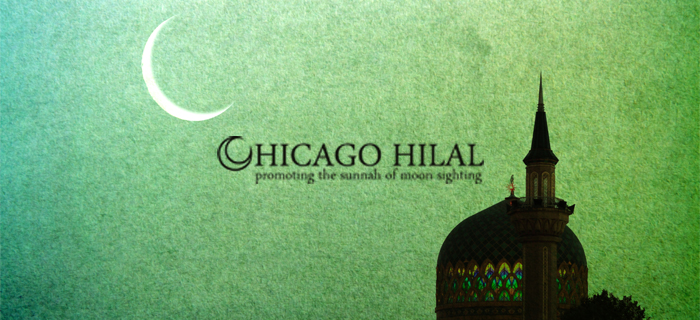Start fasting when you see the moon and end fasting when you see the moon. If you cannot see the moon because of clouds complete 30 days.
This Hadeeth has been transmitted in Sahih Bukhari. Moreover, it has been the criterion employed by the Hilal Committee of Greater Chicago since its establishment 35 years ago. According to the principle enunciated above, the sighting of the moon anywhere in North America marks the beginning of the lunar month.In the past, ISNA’s Fiqh Council has repeatedly changed their criteria. This year, they have decided to alter their standards yet again. According to the new standards, if the moon is born before noon Greenwich Time, ISNA will declare the next day to be the beginning of Ramadan; the same will apply to Eid-ul-Fitr. Based on this, they have decided that September 23, 2006 will be the start of Ramadan.On the 30th of August, the Hilal Committee of Greater Chicago, which comprises of learned scholars and jurists of Islam, held a meeting in this regard and concluded that the ISNA Fiqh Council’s decision was incorrect. In the past, the scholars of Fiqh have differed on whether the beginning of the month should start with the actual sighting of the moon or whether it should be based on mathematical calculations.In all the Islamic libraries of the world, one will find only a handful of scholars in favor of using mathematical calculations to decide the beginning of the Islamic month. Over the last 1400 years of Islamic history, not a single instance exists wherein mathematical calculation (as opposed to the actual sighting of the moon) was used to determine the beginning of the Islamic month. The Fiqh Council’s proposal to use the calculation method has been justified on the grounds of convenience. Yet earlier generations of Muslims have never considered convenience as sufficient justification for abandoning the Shari’ah, especially with regards to a matter as weighty as the month of Ramadan. Neither the contemporary American Muslim, nor any previous Muslims, have had any valid excuse for departing from the Shari’ah.With this in mind, the Hilal Committee of Greater Chicago declines to accept the decision made by ISNA Fiqh Council and appeals to all Muslims to do likewise, as their decision is clearly in conflict and violation of the Shari’ah,. Fasting (Sawm) is the fourth pillar of Islam, as per the tradition laid down by our beloved Prophet Muhammad (S), and thus under the guidance of the Shari’ah, American Muslims should begin and end their worship during Ramadan by sighting the moon. Such is the best way of ensuring that such worship is accepted by Allah.
The dates of Ramadan and Eid must be determined on the basis of conventional moon sighting principles. It is this method which the Hilal Committee of Chicago has held fast to in the past and intends to continue to abide by in the future.

